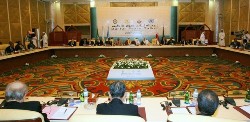Sudan and Darfur JEM begin first round of peace talks in Qatar
February 10, 2009 (DOHA) — Amid high hopes and expectations expressed by mediators, the Sudanese government and the Justice and Equality Movement met for the first time since 2006 to discuss a preliminary deal that would determine the fate of the talks.

The two delegations in their speeches during the opening session pointed out their opposite expectations of the preparatory talks. While Nafi stressed that they came to discuss the adoption of a framework agreement, Ibrahim presented the whole JEM vision for the peace talks and insisted on necessary confidence-building measures.
Two days ago local press published a text in Arabic language presented as the framework agreement that the two parties have to sign in Doha. The document provides for cessation of hostilities in Darfur and for improved security in Darfur. Also, the text speaks about the formation of a committee to deal with the pre-negotiation consultations, to promote political dialogue and to create the appropriate atmosphere for the talks. Further, it deals with power- and wealth-sharing mechanisms.
But JEM leader Khalil Ibrahim dismissed yesterday the document and described it as fabricated by the government. “It is a document prepared by the government and we will not accept one word of it; we struggle since all these years because we want a new process totally different from Abuja. We want to negotiate not only the Darfur problem but all the rights of marginalized people in the Sudan,” he said.
Jibril Ibrahim detailed in his speech the need to establish a federal system where the old provincial system is restored and he also spoke about security arrangements in which JEM troops would remain intact during the proposed transitional period in Darfur.
For his part the Presidential Assistant said they have some observations on the draft Framework Agreement, saying the remarks would contribute to improve it. Speaking to the press following the opening session he said it was agreed to discuss only the framework during this round, adding that he rest can be tackled after.
Nafi further regretted the absence of Abdel Wahid Al-Nur, the leader of the SLM mainstream and urged him to rejoin the talks.
The joint mediator of the UN and African Union, Djibril Yipènè Bassolé, who has shuttled between the warring parties since his appointment in June 2008, greeted the rebel and government representatives in Doha. The mediator invited them into an inclusive process involving all stakeholders even as the JEM rebels reaffirmed their claim to an exclusive negotiating position in the aftermath of assaults last month on a rival, government-aligned Darfur faction.
Jibril said JEM would be exclusive in its approach, reiterating its keenness to see Sudanese and particularly Darfur people take part in the making and ownership of the peace process.
JEM wants separate talks with Khartoum with the consultation of civil society, IDPs and other social forces in forums to be held on the sidelines of the peace negotiations. JEM rejects involvement by the smaller rebel groups, particularly breakaway factions that fought the rebel group or refused to join it.
Hosting the conference, the Qatari Prime Minister and Foreign Minister Shiekh Hamad bin Jassim bin Jabr Al-Thani stated the aim of reaching an agreement within a national context. He thanked the participants and referred to the meeting as the fruit of joint efforts by a Qatari-led group of mediators and the UN-AU negotiator.
Salah Halima, the envoy of the Arab League, which has backed the Sudanese president as he faces international criminal charges, praised Qatar for working to preserve the territorial integrity of Sudan.
Likewise, the leader of the Organization of the Islamic Conference, Ekmeleddine Ihsanoglu, and the chairman of the African Union, Jean Ping, addressed the opening session of the peace talks, highlighting the role of Qatar, which had solicited the mediation opportunity from the Arab League and African Union.
Other Darfur rebel factions, the SLA-Unity and SLA mainstream, yesterday criticized JEM for entering talks with the government just as an indictment is expected for Sudanese President Omer Al-Bashir.
But JEM’s chairman said from N’djamena that the peace process would not interfere with justice and that JEM would withdraw from the talks if they were used as a pulpit to promote deferring the indictment against Al-Bashir.
(ST)
